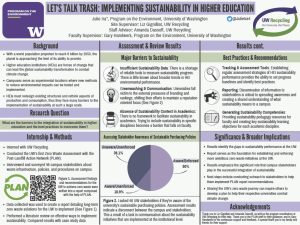Let’s Talk Trash: Implementing Sustainability in Higher Education
As major hubs of community, innovation, and education, higher education institutions (HEIs) are viable forces of change that can set the precedent for sustainability and lead the global sustainability transformation to combat climate change. While HEIs are uniquely positioned to address challenges in sustainability, there are barriers that prevent the transition from a linear economy framework to a model that embraces zero waste concepts and prioritizes sustainability. The purpose of this study was to identify the challenges to the integration of sustainability in higher education and the best practices to overcome them. Through my internship with UW Recycling (UWR) and the Post-Landfill Action Network (PLAN), I conducted the UW’s first Zero Waste Assessment. I interviewed and surveyed 45 campus stakeholders about waste-related infrastructure, policies, procedures, and standardization and communications practices on campus. Using this data, I helped PLAN and UWR produce a report outlining potential long term zero waste solutions for the University to improve sustainability performance. I cross-referenced this case study data with barriers and best practices pulled from academic literature. My findings indicate that HEIs must enforce interdisciplinary sustainable infrastructure change to foster positive behavioral change within campus communities. An example of this includes equipping educators with the tools, resources, and knowledge to incorporate sustainability pedagogy into their discipline. This case study provides important context to the role that universities play in climate change. HEIs facilitate the opportunity for individuals to adopt sustainable behavior change. Without existing systems that support sustainability, efforts to enforce behavioral change are ineffective.
